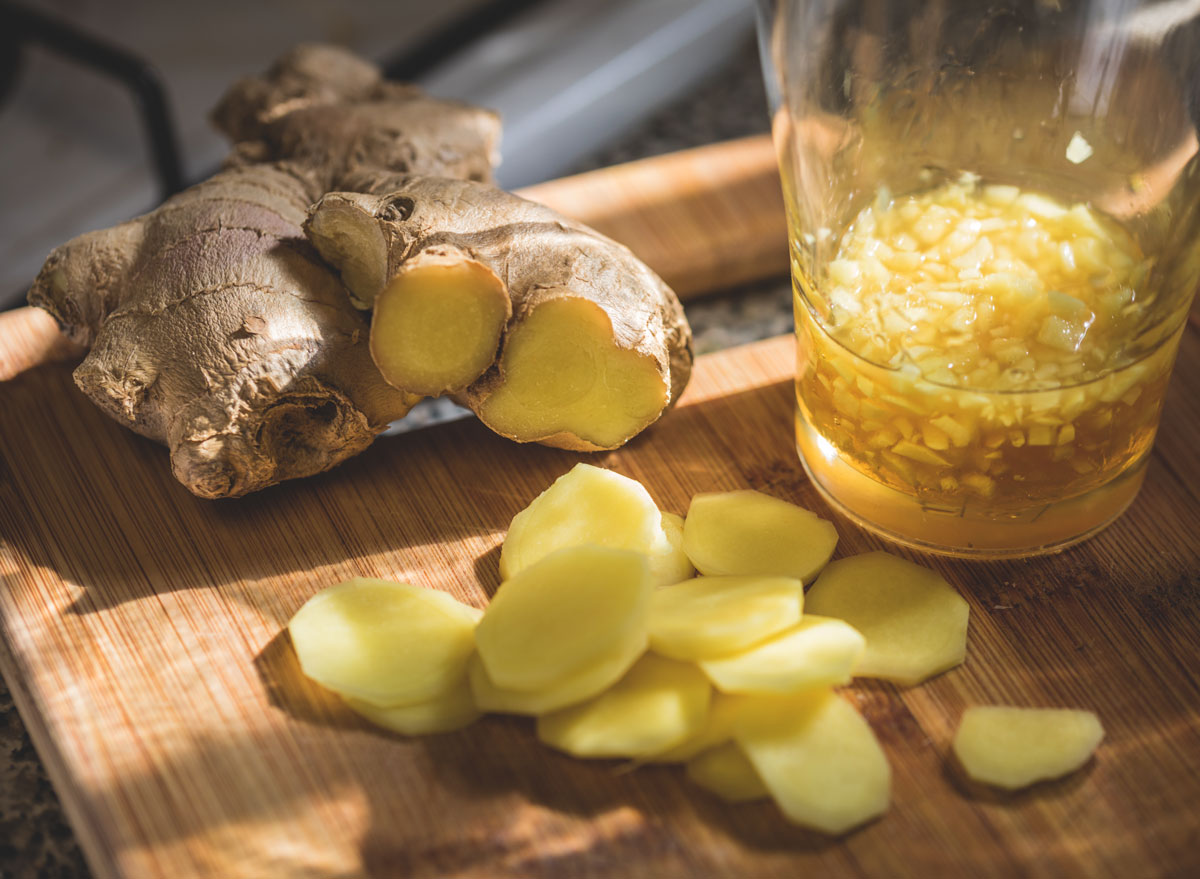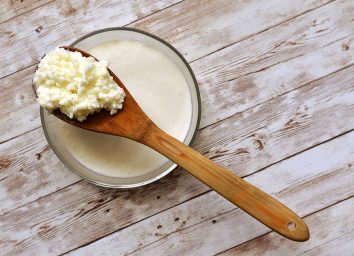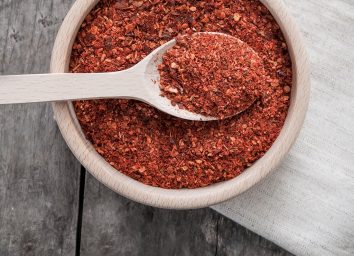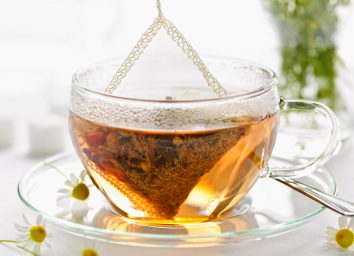10 Surprising Health Benefits of Ginger

Ginger, that pungent spice you love on meats, in marinades and dressings, and in a warm cup of tea, has incredible health benefits that will make you want to incorporate it more into your diet.
“Ginger comes in several different efficient and effective forms—fresh, frozen, dried, powdered, or even as an oil,” says Jenna A. Werner, RD, creator of Happy Strong Healthy. “It has several proven benefits and many more that are being studied, so even if you don’t love the flavor, it’s worth trying to sneak into your diet.”
If you’re looking for ways you can eat ginger that are more than just the traditional tea (although that’s amazing for you, too), Michelle Hyman, MS, RD, CDN, a registered dietitian at Simple Solutions Weight Loss, suggests the below.
- Fresh: Remove the outer skin with a vegetable peeler, the back of a spoon, or a knife, and either cut into thin slices or use a grater or garlic press.
- Frozen: Preserve leftover fresh pieces by freezing for later use.
- Powdered: Seek this out online or in specialty supermarkets for the most convenient option and least pungent taste.
- Oil: Infuse ginger into olive oil to blend into marinades, dressings, and more.
Now that you know how to eat more ginger, you can reap the health benefits of the spice. From helping with digestion to fighting against cancer, here are the ginger health benefits to know.
Ginger speeds up workout recovery.

Spike your pre-cycling class smoothie with some cinnamon and ginger, and it’s a total game changer. Both warming ingredients were proven to decrease muscle soreness after exercise in a study in the International Journal of Preventive Medicine. The jury is still out about how much and for how long you need to amp up the ginger on your menu, but it certainly can’t hurt to grate some into your soup or pasta sauce to help prevent muscle pain.
Ginger aids digestion.

There’s a reason why ginger ale was your grandma’s go-to recommendation to ease a queasy stomach. While soda is never a smart choice, ginger-infused sips actually are.
“Ginger tea has been said to help with nausea and digestion,” Werner says. “You can add a little honey or stevia to sweeten the bitterness of the ginger if you like.”
A review of ginger-related research performed prior to 2013 found that several digestive issues—including ulcers, constipation, and indigestion—might be tempered by ginger.
“Dried ginger has been used for thousands of years to treat upset stomachs and nausea. The most pharmacologically active compound in ginger is called gingerol, and it’s thought to favorably impact the gastrointestinal tract, says Ali Webster, PhD, RD, a registered dietitian and the associate director of nutrition communications at the International Food Information Council Foundation.
Ginger helps fight against cancer.

You can counteract DNA damage with a daily dose of ginger.
“Numerous lab studies also show that ginger has anti-inflammatory and antioxidant properties that may play a role in preventing diseases like cancer,” says nutritionist Rania Batayneh, M.P.H., the owner of Essential Nutrition For You and the author of The One One One Diet. One such study published in the journal PLOS ONE found that 6-Shogaol (one of the active components in ginger) might actually be more effective than one specific chemotherapy drug at combating breast cancer stem cells.
Ginger revs up metabolism.

“Ginger root can suppress appetite and rev up metabolism, and thus contribute to weight loss,” Batayneh says. And while all of our experts agreed that the natural, root form is best, “overweight women who took a combination of green tea, ginger, and capsaicin supplement for eight weeks were more likely to lose weight than those in the placebo group in one study,” Hyman says. (Note: It is important to remember to talk to your doctor and pharmacist before starting any new supplements.)
“High doses of concentrated ginger might impact blood clotting, increase stomach acid production, and can interact with some medications, so people should always check with their health care provider before starting a ginger supplement or inform them if they’re currently using one,” Webster says.
“Remember that over-the-counter supplements are not FDA-regulated,” Hyman adds.
Ginger improves circulation.

This warm spice can really warm you up by getting your blood pumping better. In addition to dozens of other benefits, research in the journal Gastroenterology Research and Practice touts the circulation-boosting qualities of ginger.
Beyond keeping your fingers and toes from too-cold territory, “better circulation might help rid the body of cellulite,” Batayneh says. And if you want to get that blood of yours pumping already, the a ginger-based smoothie is a solid way to start.
Ginger alleviates morning sickness.

“Ginger is also effective at treating nausea, especially morning sickness,” Batayneh says.
While results, dosage levels, and ginger sources (supplements versus powders) vary, the majority of studies reviewed in meta-analyses have found that ginger is more effective than a placebo at easing pregnancy-related nausea and vomiting.
Ginger chills cold symptoms.

Essentially, this little root has big results when you’re feeling under the weather. Sesquiterpenes—an antiviral chemical—puts up a strong fight against rhinovirus, while the aforementioned gingerol and shogaol relieve pain, quiet coughs, and lower fevers, says a study in the International Journal of Drug Development and Research.
Ginger reduces arthritis pain.

“I’ve had quite a few clients who started incorporating ginger into their daily routines and felt it helped with arthritis pain,” Hyman says. And science seconds this: Ginger has been shown to reduce the severity of osteoarthritis symptoms in achy knees. This is likely due to ginger’s ability to tame cellular inflammation. Ginger extract is so beneficial at diminishing swelling and related pain, it might just be a future alternative to ibuprofen and other nonsteroidal anti-inflammatory drugs (NSAIDS), University of Miami researchers suggest.
“The anti-inflammatory effect can improve joint mobility as well,” Batayneh says.
Ginger helps comfort menstrual cramps.

A healthy dose of ginger tea and 30 minutes of aerobic exercise might just be the miracle cure you’ve been seeking to calm cramps. A 750-2,000 microgram dose of ginger root powder during the first three days of your period appears to be the magic amount that works best, per a review in the journal Pain Medicine. Try adding a pinch to pancake or sweet bread batter to sneak some in.
Ginger supports Type 2 diabetes treatment.

Consuming ginger has been connected to healthier blood sugar levels and better cholesterol, says a review in the Archives of General Internal Medicine. Scientists think this may be triggered by gingerol’s skills at speeding up the rate at which muscle and fat cells eat up glucose.
Note: Before adjusting your diabetes treatment plan, consult with your doctor.








